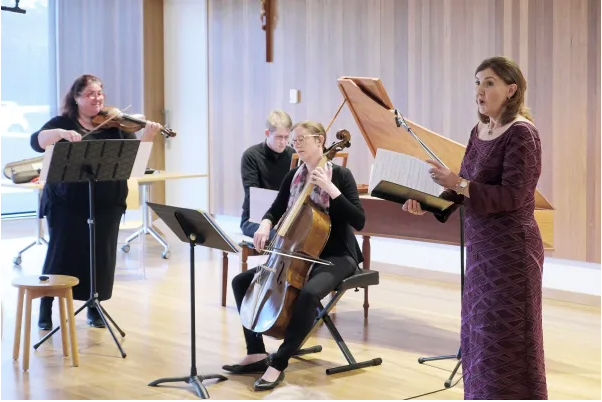Sonatas and Cantatas
Limestone Consort
Haydon Hall, St Christopher’s Cathedral, Manuka ACT
June 4, 2022
Reviewed by Tony Magee
 |
| Lauren Davis (violin), James Porteous (harpsichord), Clara Teniswood (cello) & Greta Claringbould (soprano). Photo: Peter Hislop |
ONE of the excellent things about attending a performance by Limestone Consort is the ensemble’s penchant for reviving the music of little known or forgotten composers.
Evaristo Felice Dall’Abaco (1675 - 1742) composed for the courts of Bavaria, France and Holland. His music and prowess on the violin were greatly influenced by Corelli and Vivaldi.
“Sonata for violin and cello No. 4” featured Lauren Davis on violin, Clara Teniswood on cello and James Porteous on harpsichord. It was a creditable performance, occasionally marred by intonation blemishes from the strings.
Antonio Caldara (1670 - 1736) was variously located in Venice, Mantua, Barcelona and Rome. His output includes an astonishing 70 operas and 30 oratorios as well as motets, sonatas and cantatas.
“Resoluto son gia tiranno amore” was sung by guest soprano Greta Claringbould. Her phrasing and command of the melody in this cantata were lovely, although a little more commitment to the lush and delicious syllables of the Italian text would have been appropriate.
“Sonata II for violoncello and harpsichord” by Domenico Gabrielli (1651 - 1690) was played reasonably well, but greater emphasis could have been placed on beautiful phrasing and some dynamic shading, all of which was lacking.
Baroque music is noted for being devoid of any dynamic or expressive markings on the score - something that musicians have to take control of themselves - exploring the possibilities - finding ways to express the piece as not just notes on the page, but music that lives and breathes.
“Dynamics” as we understand them are not possible on a harpsichord, but expressiveness most definitely is.
Closing with ‘The Beauteous Daphne” by Daniel Purcell (1664 - 1717), younger brother of the famous Henry Purcell, the cantata was the most successful piece on the program, with Claringbould returning, this time singing in English.
Her diction and phrasing were all wonderful, combined once again with intelligent and lyrical phrasing.
Further intonation blemishes from the strings aside, the overall effect was of a joyful interpretation, bringing to a close a concert which was historically informed and thus most interesting.
First published in Canberra City News online edition, June 6 2022